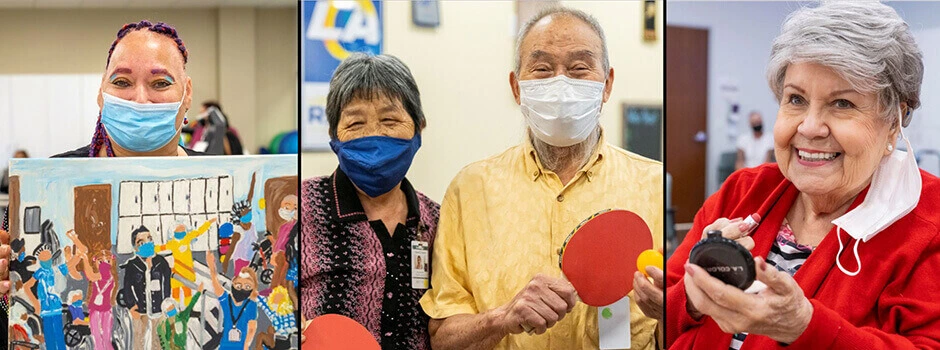The stereotypes around getting older are well-known: we get slow, weak, lonely, and depressed. Research shows these stereotypes are outdated or simply wrong.
“We can say with confidence that most prevalent opinions and stereotypes of aging were proven wrong,” reads an
AARP summary of the
AARP–National Geographic “Second Half of Life Study” conducted in late 2021.
The survey showed self-reported happiness increases with age, while stress, anxiety, and fear – even fear of death – lessens with age. About 8 out of 10 people in their 80s have one or more serious health conditions like diabetes or heart disease, yet 78-83% rated their health as good, very good, or excellent.
Tiffany Richardson, the
recreation therapy supervisor at InnovAge’s
Inland Empire PACE center in San Bernardino, California, sees this in the people she works with each day. “I learn so much from our participants,” she says. “Some of them are facing severe challenges, physically, mentally, and socio-economically. Yet they come to the center with a smile and a desire to connect and be positive. I’ve often thought to myself, if they can be positive, I most certainly can, too. It’s inspiring and motivating.”
Robyn, a participant in the
Program of All-inclusive Care for the Elderly (PACE) since 2017, is one of Tiffany’s inspirations. “I went through a lot of tough times growing up, but the most important thing that happened as I got older was that I learned to love myself,” she says. “I’m also better at taking care of myself. I know what makes me happy. I love creating art and my girlfriends and I love to dance!”
Robyn says she is more accepting of life, better at managing emotions, committed to her relationships, excited to make new connections, and motivated to help others find joy and happiness in their lives.
“I’ve learned from what I’ve experienced in the past,” she says. “That helps me make better decisions today and focus on the things that are the most important to me and my well-being.”
Two out of three of the oldest adults in the study (those over 80) say they’re living their “best possible life,” which can be explained by a psychological shift toward noticing and prioritizing the positive and letting go of the negative.
“We put so much pressure on ourselves to live up to what we think society thinks of us,” says Tiffany. “Our participants really enjoy taking part in activities and spending time together. They’re glad to be in a safe place, have a good support system, and just be alive. We can all benefit from thinking like that!”
![Benefits-of-Getting-Older-740x260-in-body-of-article.jpg Benefits-of-Getting-Older-740x260-in-body-of-article.jpg]() (L-R): Robyn’s painting of a “50s Theme Party” at the center and of her teaching painting to other seniors
(L-R): Robyn’s painting of a “50s Theme Party” at the center and of her teaching painting to other seniors
This article was medically reviewed by
Richard Feifer, M.D., MPH, FAPC. The information in this article and on InnovAge’s website is not a substitute for professional medical advice, diagnosis, or treatment. Always seek the advice of your physician or other qualified healthcare provider with any questions regarding a medical condition or treatment and before undertaking a new healthcare regimen.

 (L-R): Robyn’s painting of a “50s Theme Party” at the center and of her teaching painting to other seniors
(L-R): Robyn’s painting of a “50s Theme Party” at the center and of her teaching painting to other seniors